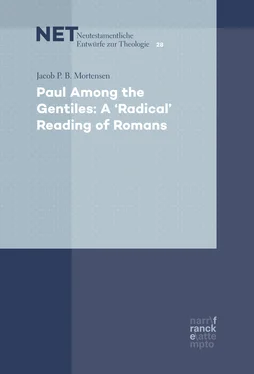Some scholars have proposed that the occasion and purpose behind the letter is Paul’s plan to go to Jerusalem. This has been proposed by Jacob Jervell.4 Jervell argues that in Romans, Paul imagines or prepares what he will say at the Jerusalem church when he arrives with the collection. As apostle to the Gentiles, Paul anticipates a conflict with the Jews in Jerusalem. Thus, Romans is Paul’s way of preparing his arguments for a discussion in Jerusalem. However, Paul never indicates that there was even a question concerning the circumcision of Gentiles. Why would Paul send such a ‘secret letter’ to Rome, if he actually has Jerusalem in mind? If Paul wanted the Roman congregation to stand behind him because it occupied a prominent position in the heart of the Gentile world,5 and his gospel would ring hollow if he had not yet visited Rome, such reasoning amounts to ‘letting the tail wag the dog’.6 The collection to be taken to Jerusalem cannot explain the major thrust of the letter, nor be the major clue to its interpretation, because Jerusalem appears only as a tangential element.7 If ‘the Jerusalem trip’ is favoured as a solution, it is at the cost of the rhetorical integration of the letter’s framework with its body, and the entire rhetorical integrity and continuity of 1:18 to 15:13. Too much of the letter appears to be targeting concerns in Rome, not Jerusalem, especially 12–15. Paul mentions Jerusalem only to buttress his authority as an apostle, also in Rome.
Some scholars have proposed that the purpose of Romans was to provide an apostolic foundation for the congregation in Rome,8 or that Paul exercised authority as apostle to the Gentiles.9 In Rom 15:20, Paul claims that he would not build on another’s foundation. However, that seems to be exactly what he was doing. Günter Klein has observed that Paul must have thought that the Roman congregation lacked a proper apostolic foundation, and, hence, was not a proper church of God.10 But if the Roman congregation lacked a proper foundation, why would Paul speak so highly of it (1:8; 15:14)? Besides, Paul never explicitly identifies the need for an apostolic foundation for Rome as a justification for his visit in 15:24, 32. Instead, he writes about Jerusalem and Spain. And finally, very little of the content of the letter can be marshalled in support of Klein’s proposed purpose for Romans.
L. Ann Jervis agreed with Günter Klein that Paul was, indeed, exercising authority over the Romans as apostle to the Gentiles, even though her point of departure was the letter’s framework.11 However, the problem with Jervis’s position12 is that it is unclear how the framework of the letter explains the body, or explains Paul’s primary purpose in writing. For instance, why does Paul argue so strongly about Judaism in a letter to Roman Gentiles, or about the relationship between the ‘strong’ and the ‘weak’? What is lacking in Jervis’s exposition is that Paul does not ground his apostolic authority as an end in itself; he does it so his advice to the Roman congregation will be followed.
Francis Watson has argued that Paul wrote Romans primarily to unite divided communities.13 Watson argues that the Roman Jewish Christians met for worship separately from the Gentile Christians, and that Paul wanted the two groups to come together, even if the Jewish Christians were forced to leave the synagogue in the process.14 According to Watson, the Roman Gentile ‘strong’ are to ‘welcome’, the Jewish Christian ‘weak’ who attend their gatherings. However, Watson does not explore the possibility that both the ‘weak’ and the ‘strong’ could be Gentile believers, when Paul urges non-law-observing Gentiles to welcome the law-observing Gentiles ‘into’ their house. The word ‘welcome’ (προσλαμβάνω) in 14:1 and 15:7 does not indicate that the ‘weak’ and the ‘strong’ previously met as separate groups. Rather, προσλαμβάνω is used in these verses in the middle form, in the sense of ‘accept’ or ‘receive’. As in the letter to Philemon, Paul is no stranger to Philemon, yet he admonishes him to ‘welcome’ him. Consequently, the ‘strong’ and the ‘weak’ are not separate groups, but factions within the same congregation. To argue that 14:1 and 15:7 indicate two separate groups is to give these verses too much weight, and it goes directly against the olive tree metaphor in 11:17–24, where the Gentiles do not form their own separate tree, but are dependent on Israel. Thus, the problem in the Roman assembly was that the ‘strong’ and the ‘weak’ disapproved of each other’s practices when they were together. Therefore, in 14:1 Paul never asks the ‘weak’ to abandon their Jewish practices, but instead calls for mutual acceptance (15:7).
The most popular theory about the situation behind Romans argues from the record of the Edict of Claudius, expelling the Jews from Rome because of a squabble over ‘Chrestus’. If ‘Chrestus’ refers to Christ, then someone believed in Christ in the Roman synagogues in the late 40s. After Claudius’s edict of expulsion, usually placed in the year 49, the Jews were forced to leave Rome. The Gentiles, who had learned of Christ in and from the Jewish communities, were not forced to leave Rome, but now had to meet on their own. When Nero became emperor in 54, the expelled Jews were able to return to Rome, only to find ‘Christianity’15 thriving. The argument goes that during the years of the Jews’ absence from Rome, Gentile converts had joined the assemblies. These Gentiles would not have the same appreciation of Judaism as the ‘Christians’ of the synagogues would have had. Consequently, the Gentile ‘strong’ would have found themselves in conflict with the returning Jewish ‘weak’. The Jewish followers of Christ, who had comprised the majority of ‘Christians’ in Rome prior to their expulsion in 49, found themselves in the minority on their return. Now, the non-Law-observing majority questioned the ethnic practices of the returning Jews. Thus, according to scholars who favour this interpretation, Paul wrote Romans to resolve the tensions between the Gentile non-Law-observing ‘strong’ and the law-observing Jewish ‘weak’. Such tensions would require Paul to summarize his gospel insofar as it concerns the relationship between Gentiles and Jews in God’s historic plan for Israel. He would have to exposit his gospel more fully, to successfully persuade an audience that did not personally know him and his preaching.
Some scholars, such as Wayne A. Meeks and J. Paul Sampley, have questioned whether the letter to the Romans offers adequate evidence for a specific reconstruction of the Roman situation.16 They argue that Paul’s approach is rather oblique, and that he employs rather vague formulations.17 According to Meeks and Sampley, Paul identifies the situation more directly in his other letters than he does in Romans.18 Paul had never visited Rome, so his letter may more accurately reflect his own life and ministry, rather than any particular circumstances in Rome. Similarly, in his review of 14:1–15:13, Robert J. Karris argued that, in a more generalized manner, Paul was reiterating to the ‘weak’ and the ‘strong’ of Rome his exhortation to the ‘weak’ and ‘strong’ of Corinth, regarding meat sacrificed to idols.19 However, the peculiar details of Rom 14–15 and the differences between Romans and 1 Corinthians defy such a conclusion – and the same applies to the differences between Romans and Galatians.
The differences between Romans and 1 Corinthians more than suggest different situations underlying the two letters. For instance, in Romans, Paul never mentions food offered to idols, the possibility of eating in the temple of an idol, or the problem of ‘knowledge’. Instead, and moreover, Paul adds certain specifics to the Roman situation, for instance, that the ‘weak’ in Rome eat vegetables, observe days, and abstain from wine, features that do not characterize the Corinthian ‘weak’. These specifics limit the applicability of the paraenetic instructions to a specific situation in Rome, rather than widen the perspective in a generalized way. Another important feature is the space Paul devotes to the problem, and his careful descriptions of the opposing positions in the congregation. He even numbers himself among the ‘strong’ (15:1) in this conflict, which indicates that he is well aware of the issues involved. The rationale must be that, since he can predict his allegiance to one of the two groups in the conflict, he must somehow know where they stand. Otherwise, using ‘false’ designators would cripple his case. Thus, Paul’s use of the designations ‘strong’ and ‘weak’ adds to the specificity of the situation, since it would have been counterproductive to apply these labels to the congregation, had he not known them to identify specific groups.20 Finally, Rom 14–15 inhabits a prominent position as the climax of Paul’s exhortations at the end of the paraenesis. It suggests the immediate applicability of these matters to the Roman congregation. Thus, the placement of these exhortations in such a prominent position in the letter clearly reflects the community’s needs.21
Читать дальше












